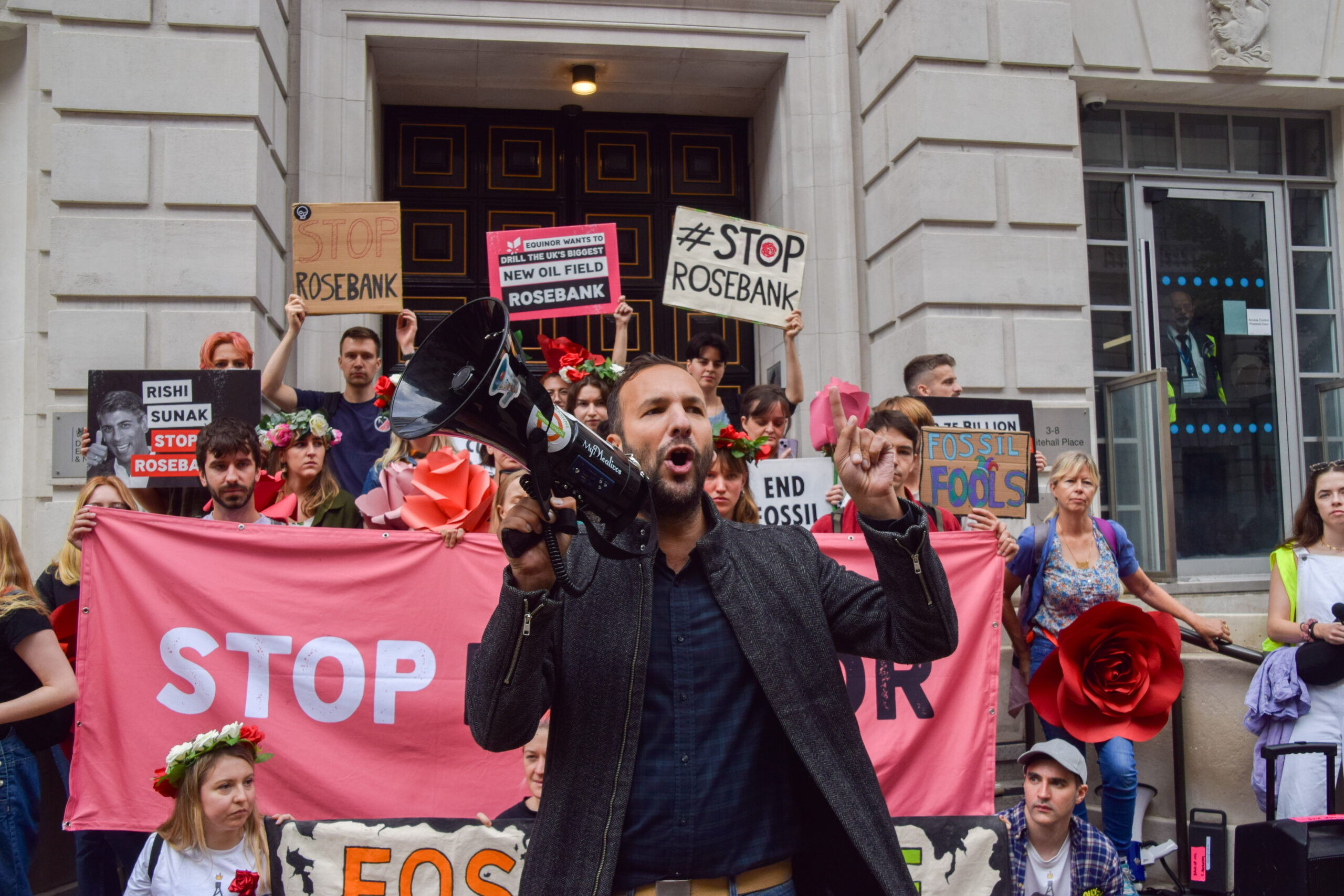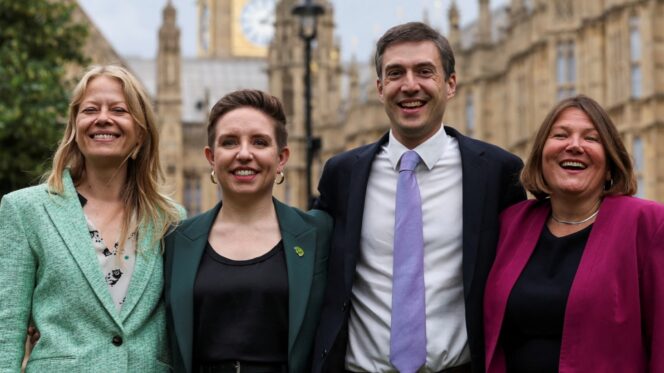Greens, Please – Stop Looking Like the Establishment
‘Credibility’ won’t cut it.
by Adam Ramsay
12 May 2025

Paywalls? Never. We think quality journalism should be free for everyone – and our supporters make that possible. Chip in and help build people-powered media that everyone can access.
The background image in the campaign launch video is the Palace of Westminster. The music, that genre of pounding electronica generic on TV news. The clothes are ironed. The key word – emphasised by Ellie Chowns – “credible”.
“After the next election, with experienced leadership, Green MPs could hold the balance of power,” says the North Herefordshire MP. “We need our leaders to be here, in Westminster,” adds Adrian Ramsay, the incumbent co-leader and MP for Waveney Valley.
“Follow us,” the duo told party members as they launched their bid to be Green party co-leaders, “and we will take you into the establishment”.
To be fair, they nailed their pitch. The problem is, it’s the wrong strategy.
Survey after survey shows that British people have some of the lowest levels of trust in their political system in the western world. Only 23% of us have confidence in parliament. Trust is lowest among the younger voters who are key to the Greens’ potential electorate.
The Chowns-Ramsay bid represents a clear contrast with that launched last week by the current deputy leader Zack Polanski. His opening video, where he walks through different settings across Britain to pounding bass guitar, has an angrier tone, calling for the party to be “bolder… clearer in what we stand for, and, crucially, what we will always stand against… a party which will confront fascism, and call a genocide exactly what it is”. He isn’t seeking to be “credible” in the eyes of the system. He wants to burn it down.
The Guardian’s Peter Walker summarises the difference as between ‘election focused’ or ‘activist’ leadership. That is, I think, a mistake. Polanski’s strategy is clearly focused on winning seats in the election – he highlights the 39 constituencies where Greens came second to Labour last time. The distinction is between two different electoral strategies.
Where Chowns and Ramsay say they want to be “credible”, they mean credible in the eyes of the system – which ultimately means ‘we’ll go gently, and avoid upsetting the media and political class’. For Greens, the options for media coverage are either to be controversial or to be ignored, and “credibility” is code for the latter. The counterweight to this – which Ramsay has rightly emphasised for years – is the hard work of door knocking and local representation. This is what allowed both MPs to win their surprisingly rural seats, and has grown Green councillor numbers across Britain.
But the problem with their electoral strategy is that it’s not clear which future seats it would deliver. In those two places, Greens managed to get a nose ahead of the Lib Dems while the party was still suffering from its post-coalition unpopularity. Now, Ed Davey is mopping up the anti-Tory/Reform vote in most of rural England.
Polanski – himself an elected member of the London Assembly who has spent much of his time as deputy leader on doorsteps across the country – wouldn’t argue against the need for leafleting and canvassing. But where Ramsay and Chowns represent rural seats, he comes from Hackney, which is part of an arc of 17 adjoining seats in inner-east London where Greens came second last year, despite very little campaigning. In a handful of others in the area, leftwing independents were runners up, offering obvious possibilities for alliance. Every other seat where Greens came second is in the centre of a major city – Manchester, Leeds and Sheffield. What Polanski understands is that hyper-local campaigning isn’t sufficient to win MPs in larger urban centres where people often live, work and socialise across constituency boundaries. You need to embrace controversy.
The fear of controversy also fails to speak for the electoral coalitions Greens need to put together in these seats: potential Green voters in city centres are angry, and the party can only win by channelling that rage. More MPs won’t come from looking credible to the media. It will be delivered by organising and expressing that fury – including the rage at the political system which Ramsay and Chowns present themselves as a part of.
This debate isn’t new – it’s raged in Green parties across Europe. Where those over-focused on parliamentarianism have won (Germany, Ireland), the results have been disastrous. In 2007, Greens went from 7 to 2 MSPs in Holyrood, after four years of a strategy of heavily focusing on parliamentary work. I had the job of writing the report afterwards on why they’d lost their seats. The obvious answer was that they’d got too bogged down in the institution.
In 2021, Carla Denyer and Adrian Ramsay – then non-MPs – ran to be Green co-leaders on the grounds that they were candidates in the Greens next two targets, and electing them would help them win. Now, it’s Zack Polanski who represents the next generation of Green target candidates, making him the strategic choice for next party leader.
Adam Ramsay is a Scottish journalist. He is currently working on his forthcoming book Abolish Westminster and has a Substack of the same name.


